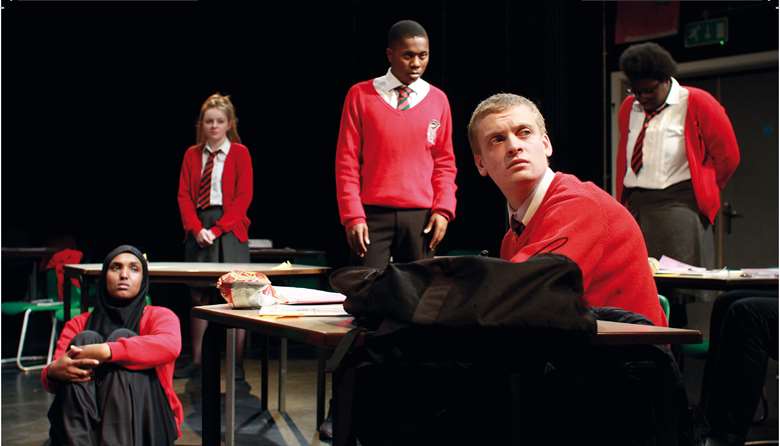Difficult subjects
Rhianna Elsden
Saturday, February 1, 2020
Rhianna Elsden speaks to Suzann McLean, CEO and artistic director of Theatre Peckham about their production of Extremism

FELIX FOUEILLIS
I caught up with Suzann McLean during another busy day at Theatre Peckham, to talk about her recent production of Anders Lustgarten's play Extremism and to find out more about the exciting projects that the theatre is initiating through its new Young Londoners grant.
The play
Lustgarten's Extremism was first seen as part of the NT Connections festival in 2017 and is a play which many GCSE and A Level teachers may well have used either as a performance text for their young actors, or as the basis of devising units.
The play looks at what happens among a group of young people when a new student at a school is reported by a teacher for showing signs of radicalisation, and taken away. Suzann McLean directed a cast of emerging young actors for their recent highly successful run of the play, and had some very useful insight for anyone else approaching the text.
‘We put a lot of work into making the production 100% realistic and truthful so that when some of the [provocative key] lines were dropped (which were things which no one should speak to another person), they weren't over-played, they were just played like they were thrown away, because that's how they are,’ said McLean.
The brilliance of the writing is that characters are not easy to label and dismiss, instead they are young people who ‘have been fed information which they are then figuring out for themselves without yet being aware of the impact of what they are saying,’ notes McLean.
McLean spoke of the text as one that could, to its detriment, be played very stereotypically rather than being representative of real life. Disempowering comments are often not challenged by those peripherally because they are only said, rather than shouted or expressed angrily. In addition, and indeed complimenting this naturalistic delivery style, an original approach was taken to the staging which again could be inspiring to others working with the text. The staging was immersive, with the audience coming in and sitting at desks that were part of the set, which had the effect of making the audience connect with the themes more acutely and feel a sense of responsibility for the action unfolding close to them.
Engagement opportunities
Running alongside the production were ‘Conversation Stations’ – post-show discussion opportunities which were incredibly well-received by the audiences; McLean explained the reason for the initiative: ‘the production affected people on lots of different levels and the nature of the play leaves you with many questions. I wanted there to be a space where people could have a discussion; and even if they didn't want to join in the discussion, it's about listening to someone else's perspective.’ Anyone working with the text within a school context, or exploring its themes, could well use this initiative or something similar within the process, ensuring young people feel supported if they are affected by the issues presented.
Another part of our conversation revolved around the theatre's award of a 3-year grant from the Mayor of London's £45 million Young Londoners Fund. The aim is to use the money to further inspire Peckham's young people to participate in local community activities and to improve confidence, mental well-being, resilience and communication skills.
One of the projects that will be running this year enabled by the fund focusses on the year of transitioning from Primary to Secondary schools: ‘statistics show that this is the period where a lot of young people fall through the net, and this project uses the Arts to bridge that relationship,’ says McLean. If you work at a school close by, Theatre Peckham would love to hear from you about being part of this important project.

